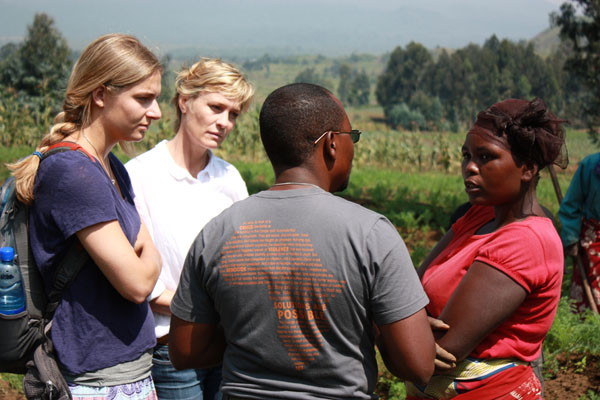
Editor's Note: Actress and activist Robin Wright recently traveled to eastern Congo with the Enough Project. Her op-ed reflecting on the trip and what advocates can do to promote peace originally appeared on the homepage of Huffington Post, along with her video trip diaries.
I am currently acting in the Hollywood version of the bestselling book, "The Girl with the Dragon Tattoo." The thriller tells the story of a high-stakes effort to unravel the case of a serial killer who has committed unspeakable crimes against women.
The film is a gripping, graphic work of fiction. But it confronts an issue that scars women the world over, though perhaps nowhere more dramatically than in the Democratic Republic of Congo.
After we finished filming "Tattoo," I traveled to the war-torn eastern region of Congo to learn about a horrific epidemic of violence against women playing out every day in real life.
At the height of Congo's war — which officially ended in 2003 but remains a daily reality for most Congolese in the east — soldiers and mercenaries from eight different countries fought in the mineral-rich region, many of them plundering the country's wealth. Though most of the foreign fighters are gone now and some of the Congolese rebel groups have joined the national army, the civilians living in the conflict zone have seen no relief.
In war, women and children are often caught in the crossfire. But in Congo, where conflict is fuelled by the struggle over valuable minerals, rebels and even soldiers in the notoriously undisciplined Congolese army systematically target civilians — elderly women, toddlers, middle-aged fathers, young girls, mothers, teenage boys — using rape as a weapon to assert control over communities. The minerals that the armed groups are after become essential components in the electronics products that we're dependent on — the cell phones, laptops, cameras, iPods that we use every day without even a thought about their origin in the world's deadliest war zone since World War II.
The link between Congo's conflict minerals and sexual violence is undeniable. In eastern Congo I met with survivors of these atrocities who are now ostracized by their communities because of the shame of sexual violence. Reflecting on the trip now, I realize that at once, these interactions represented the moment when I felt the most despair about the severity and complexity of the conflict, but also the most inspiration about the resiliency of the survivors and the dedication of local advocates working to rehabilitate the women and provide them with vocational skills.
As conscientious consumers, we can all do more to alleviate this plight — most of all by helping prevent the violence that leaves women incapacitated, like one woman I met in the town of Bukavu who has undergone eight surgeries to try to reconstruct her tattered female organs after being raped.
Right now, the conflict-free movement in the United States is growing, as more and more people learn about the conflict in Congo and demand that the companies they buy from proactively work to ensure their minerals supply chain from Congo doesn't fund armed groups. Through our collective efforts, we must pressure the U.S. government and electronics companies to implement an international certification scheme that enables companies to trace the source of the minerals, and that allows consumers to choose who to give business to, based on their human rights record in Congo.
Women in other countries around the world, including the United States, suffer from the scourge of sexual violence, though the stories I heard in Congo are exceptional in their brutality. So why focus on Congo? Because the war is an accountability issue for each and every one of us.
Actor and activist Robin Wright, @RealRobinWright, recently traveled to eastern Congo with the Enough Project, a Washington, D.C.-based group focused on ending genocide and crimes against humanity.

